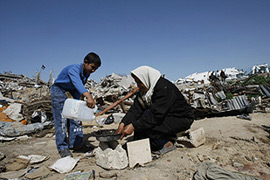Mubarak absence mars Arab summit
Egypt’s president among nine leaders absent from meeting aimed at healing divisions.

At a news conference late on Saturday, Sheikh Hamad bin Jassem bin Jabr al-Thani, the Qatari prime minister and foreign minister, said that Qatar “respected the Egyptian decision not to attend even though President Hosni Mubarak would have enriched and enlightened the summit with his ideas”.
Amr Moussa, the secretary-general of the Arab League, conceded at the conference that Arab differences remained, but pledged to work on “managing the existing rifts to defuse or at least decrease the tensions”.
It was confirmed at the conference that Hamas leaders and Mahmoud Ahmadinejad, the Iranian president, would not join the meeting.
‘Closing ranks’
A Qatari official expressed hope that the Doha gathering will “serve to streamline Arab relations and relaunch a common Arab action that has a firm basis”.
| In depth |
|
|
But Al Jazeera analyst Lamis Andoni said: “The decision [by Mubarak] proves that the outstanding issues between Egypt and Qatar have yet to be resolved.
“Moussa’s statement reflected a recognition that a summit alone cannot resolve the persisting differences which had prompted several leaders to refrain from taking part in the meeting,” she added.
Opening Saturday’s meeting the Qatari prime minister said: “We have to live up to our responsibilities and work towards closing ranks.
“The challenges are numerous and threats are many, and the Arab people are looking to us to see if our words will be coupled with actions.”
Egypt and Qatar have recently taken rival approaches to the Palestinian crisis as Cairo continues to mediate talks aimed at Palestinian reconciliation and forging a sustainable ceasefire between Israel and Hamas, the Palestinian group ruling the Gaza Strip.
Cairo and Saudi Arabia are staunch supporters of Mahmoud Abbas, the Palestinian president, while Damascus and Doha back Hamas, which forced Abbas’s Fatah loyalists from Gaza amid factional fighting in June 2007.
Israel and Iran
Prospects for peace in the Middle East could also come under pressure from the pending return to power in Israel of Benyamin Netanyahu, whose Likud party rejects the creation of an independent Palestinian state and takes a hard line on security issues.
 |
| Converting Gaza reconstruction pledges into reality will be high on the summit agenda [AFP] |
While acknowledging the urgency of Gaza’s reconstruction, Arab governments led by Saudi Arabia are wary of growing Iranian influence in the region, especially Tehran’s nuclear programme and its support for Hamas and Lebanon’s Hezbollah group.
Some Arab states share Western powers’ fears that Iran is trying to build an atomic bomb under a civilian cover.
“As much as we appreciate Iran’s support for Arab causes, we would like to see it channelled through Arab legality and be in harmony with its objectives,” Saud al-Faisal, the Saudi foreign minister, said earlier this month.
The Doha summit follows a recent meeting by Abdullah bin Abdulaziz Al Saud, the Saudi king, with the presidents of Egypt and Syria which allowed Cairo and Riyadh to improve contacts with Damascus – a major ally of Iran – which had worsened during the war on Gaza.
Abdullah warned last week that “the Palestinian dispute … is more serious in jeopardising our just cause than Israeli aggression”.
Bashir warrant
Omar al-Bashir, the Sudanese president, who is facing arrest for alleged war crimes committed in his country’s western Darfur province after a warrant was issued by the International Criminal Court (ICC), is expected to attend the conference.
Ziad Haidar, a Syrian journalist, told Al Jazeera that Syria and Egypt regard the warrant as a “political and not a legal issue”.
He said that if the two countries can persuade Russia and China, their UN Security Council member allies, to prevail on the ICC to postpone al-Bashir’s arrest “at least for a year”, they could buy time for mediation to resolve the Darfur issue.
In his opening address Moussa expressed hope that Qatar would continue mediating talks on Darfur until a breakthrough is achieved.

 Regional crises hound Arab League
Regional crises hound Arab League